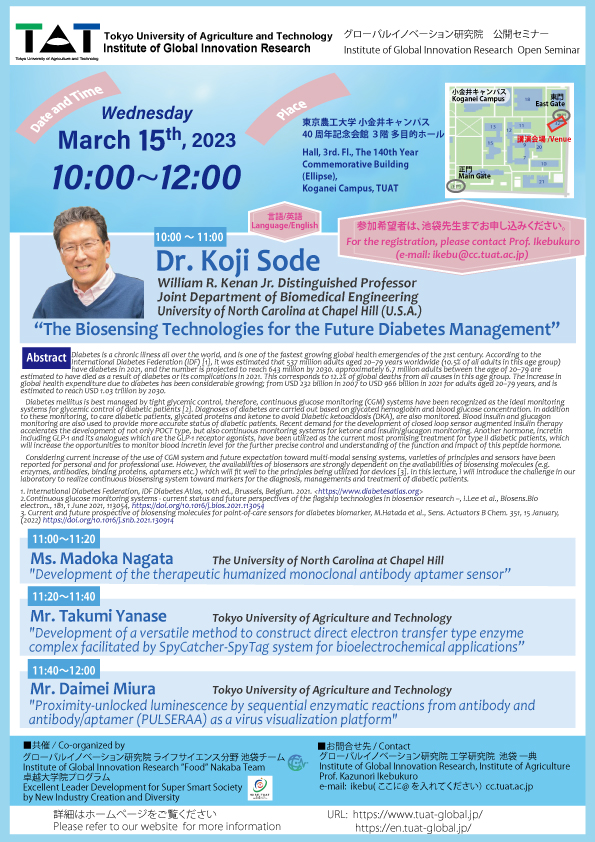イベント情報
【GIR公開セミナー】 Dr. Koji Sode / ノースカロライナ大学 チャペルヒル校(米国)

| 日時 | 2023.3.15(10:00~12:00) |
|---|---|
| 会場 | |
| 講演者 | Dr. Koji Sode |
| 所属機関 | ノースカロライナ大学 チャペルヒル校 (米国) |
| 講演タイトル | ①10:00〜11:00 Dr. Koji Sode(米国、ノースカロライナ大学 チャペルヒル校、教授) "The Biosensing Technologies for the Future Diabetes Management" <講演要旨> Diabetes is a chronic illness all over the world, and is one of the fastest growing global health emergencies of the 21st century. According to the International Diabetes Federation (IDF) [1], it was estimated that 537 million adults aged 20–79 years worldwide (10.5% of all adults in this age group) have diabetes in 2021, and the number is projected to reach 643 million by 2030. approximately 6.7 million adults between the age of 20–79 are estimated to have died as a result of diabetes or its complications in 2021. This corresponds to 12.2% of global deaths from all causes in this age group. The increase in global health expenditure due to diabetes has been considerable growing; from USD 232 billion in 2007 to USD 966 billion in 2021 for adults aged 20–79 years, and is estimated to reach USD 1.03 trillion by 2030. Diabetes mellitus is best managed by tight glycemic control, therefore, continuous glucose monitoring (CGM) systems have been recognized as the ideal monitoring systems for glycemic control of diabetic patients [2]. Diagnoses of diabetes are carried out based on glycated hemoglobin and blood glucose concentration. In addition to these monitoring, to care diabetic patients, glycated proteins and ketone to avoid Diabetic ketoacidosis (DKA), are also monitored. Blood insulin and glucagon monitoring are also used to provide more accurate status of diabetic patients. Recent demand for the development of closed loop sensor augmented insulin therapy accelerates the development of not only POCT type, but also continuous monitoring systems for ketone and insulin/glucagon monitoring. Another hormone, incretin including GLP-1 and its analogues which are the GLP-1 receptor agonists, have been utilized as the current most promising treatment for type II diabetic patients, which will increase the opportunities to monitor blood incretin level for the further precise control and understanding of the function and impact of this peptide hormone. Considering current increase of the use of CGM system and future expectation toward multi-modal sensing systems, varieties of principles and sensors have been reported for personal and for professional use. However, the availabilities of biosensors are strongly dependent on the availabilities of biosensing molecules (e.g. enzymes, antibodies, binding proteins, aptamers etc.) which will fit well to the principles being utilized for devices [3]. In this lecture, I will introduce the challenge in our laboratory to realize continuous biosensing system toward markers for the diagnosis, managements and treatment of diabetic patients. 1. International Diabetes Federation, IDF Diabetes Atlas, 10th ed., Brussels, Belgium. 2021. <https://www.diabetesatlas.org> 2. Continuous glucose monitoring systems - current status and future perspectives of the flagship technologies in biosensor research –, I.Lee et al., Biosens.Bioelectron., 181, 1 June 2021, 113054, https://doi.org/10.1016/j.bios.2021.113054 3. Current and future prospective of biosensing molecules for point-of-care sensors for diabetes biomarker, M.Hatada et al., Sens. Actuators B Chem. 351, 15 January, (2022) https://doi.org/10.1016/j.snb.2021.130914 ②11:00〜11:20 Ms. Madoka Nagata(米国、ノースカロライナ大学 チャペルヒル校) "Development of the therapeutic humanized monoclonal antibody aptamer sensor" ③11:20〜11:40 Mr. Takumi Yanase(東京農工大学) "Development of a versatile method to construct direct electron transfer type enzyme complex facilitated by SpyCatcher-SpyTag system for bioelectrochemical applications” ④11:40〜12:00 Mr. Daimei Miura(東京農工大学) "Proximity-unlocked luminescence by sequential enzymatic reactions from antibody and antibody/aptamer (PULSERAA) as a virus visualization platform" |
| 言語 | 英語 |
| 対象 | 参加申し込みが必要です。 |
| 共催 | グローバルイノベーション研究院 ライフサイエンス分野 池袋ユニット 卓越大学院プログラム |
| お問い合わせ窓口 | グローバルイノベーション研究院・工学研究院 池袋 一典 e-mail: ikebu(ここに@ を入れてください)cc.tuat.ac.jp |
| 備考 | ※参加希望者は、池袋一典先生 (ikebu@cc.tuat.ac.jp)までお申し込みください。 |
このページの上部へ